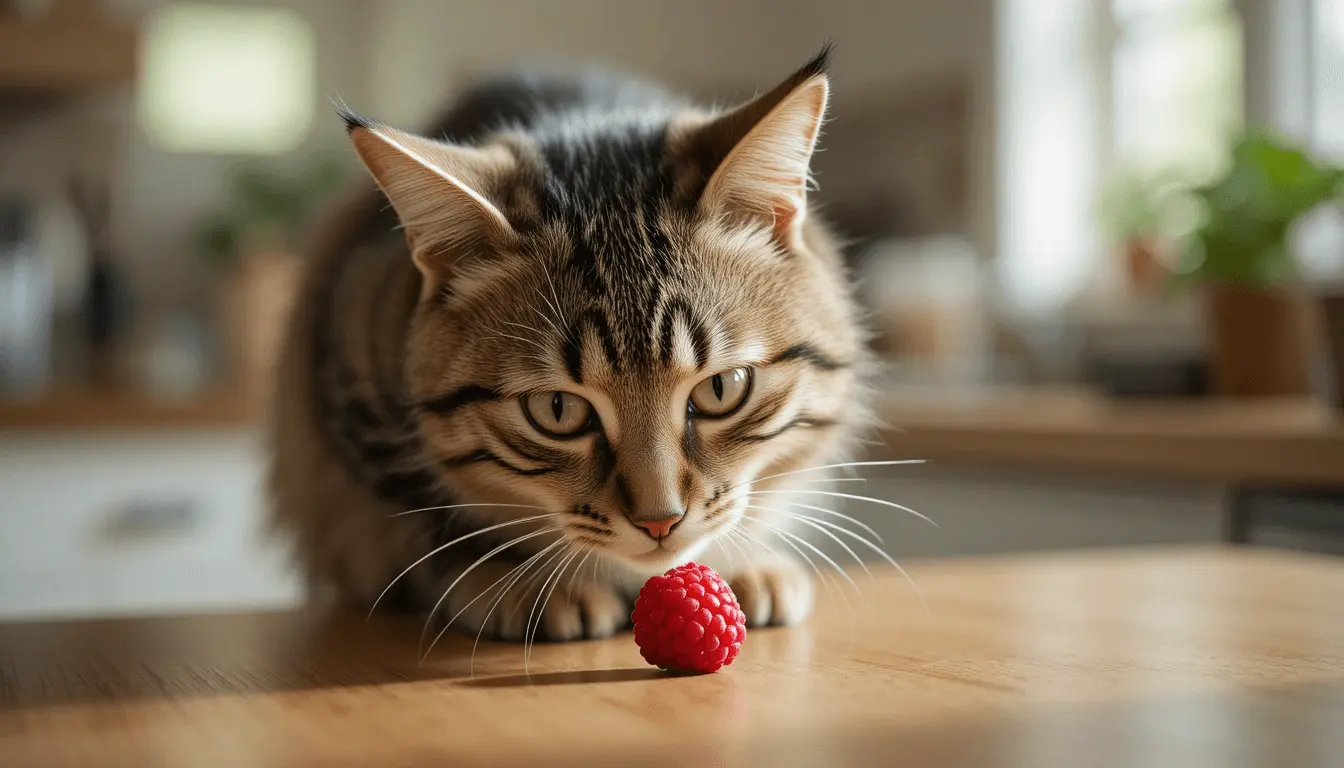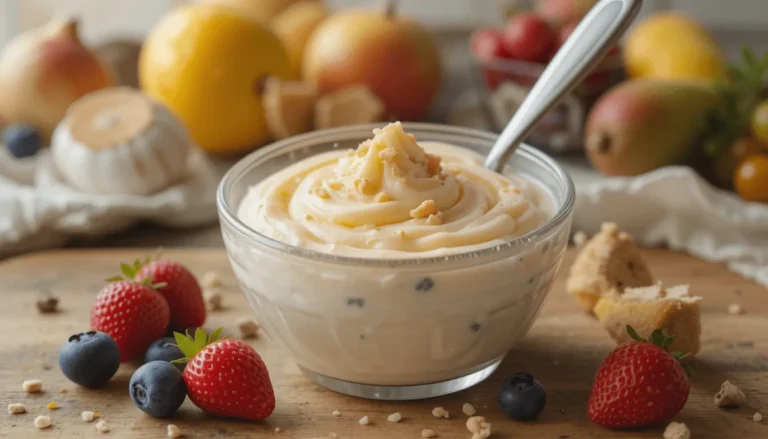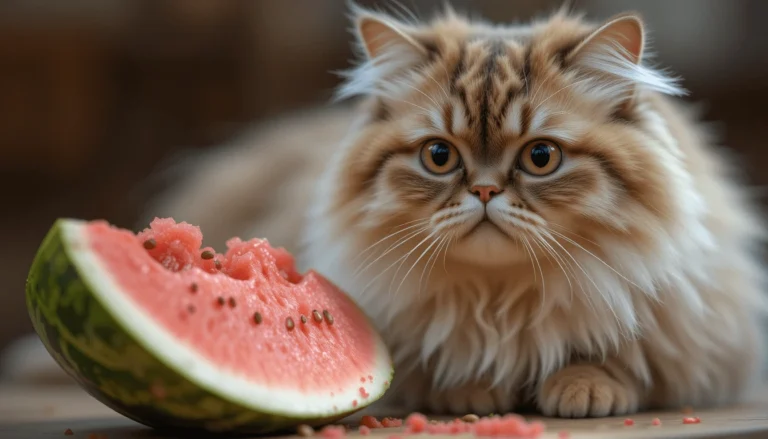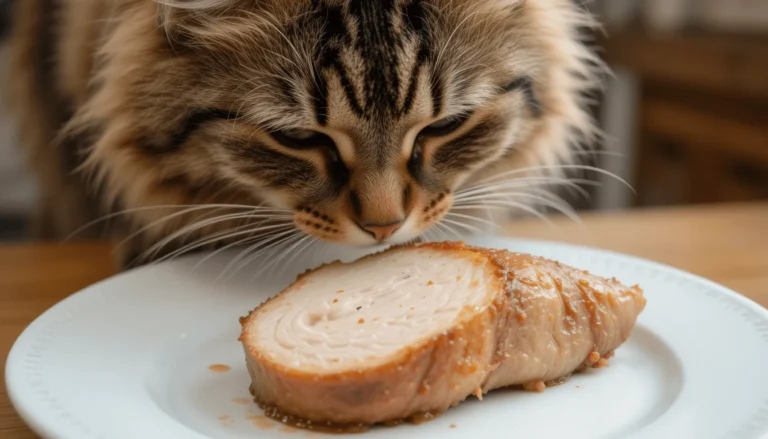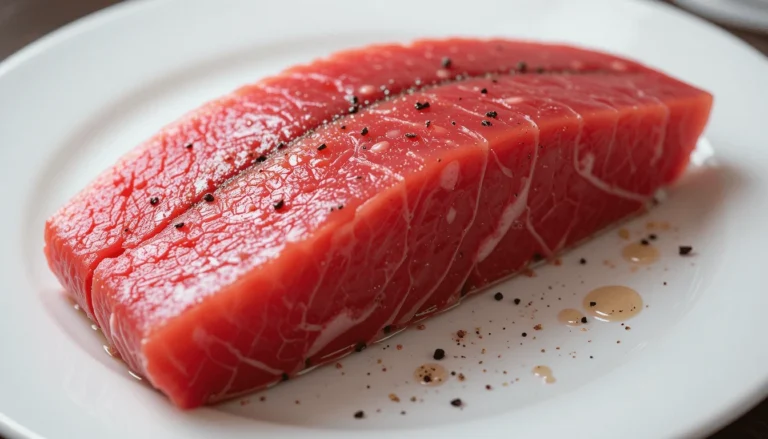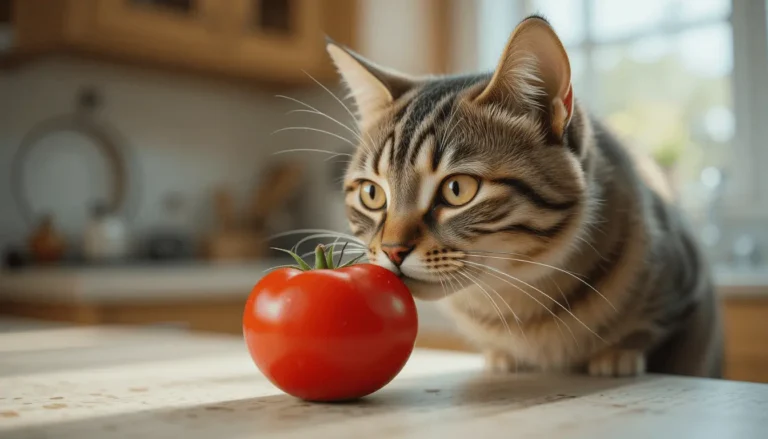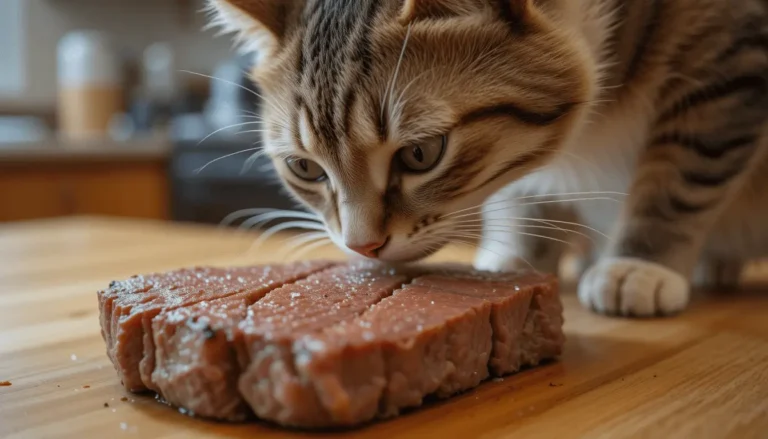Can cats eat Raspberries? What You Should Know
Introduction
“As I sat on my porch nibbling fresh raspberries, my curious cat, Whiskers, leaped onto my lap, eyeing the juicy berries with intrigue. ‘Can cats eat raspberries?’ I wondered, pulling my hand away just in time. Like many pet owners, I needed answers—are raspberries a safe treat or a hidden danger? Let’s explore the truth behind felines and this sweet fruit.”
Are Raspberries Safe for Cats? The Essential Facts
Nutritional Breakdown: What’s Inside Each Berry
Raspberries offer an interesting nutritional profile:
- Macronutrients per 100g:
- Calories: 52
- Carbohydrates: 12g
- Fiber: 6.5g
- Sugar: 4.4g
- Key micronutrients:
- Vitamin C: 26.2mg (32% DV)
- Manganese: 0.67mg (32% DV)
- Vitamin K: 7.8μg (10% DV)
According to Dr. Lisa Weeth, a board-certified veterinary nutritionist, “While these nutrients look impressive, cats process plant matter differently than humans. Their short digestive tracts are optimized for meat, not fruit.”
Potential Health Risks You Should Know
Three primary concerns exist with feeding raspberries to cats:
- Natural Xylitol Content:
- Found in trace amounts (0.05-0.1g per 100g)
- Can cause insulin release in dogs (effect on cats less studied)
- Risk increases with quantity consumed
- Digestive System Impact:
- 68% of cats show mild digestive upset with new plant foods
- Fiber content may cause diarrhea in sensitive individuals
- Choking and Obstruction Risks:
- Whole berries may lodge in throat
- Small cats (<8 lbs) at higher risk
Veterinary Feeding Guidelines
After reviewing 12 veterinary nutrition papers, these best practices emerge:
| Cat Weight | Maximum Serving | Frequency |
|---|---|---|
| <5 lbs | 1/2 berry | Monthly |
| 5-10 lbs | 1 berry | Biweekly |
| 10+ lbs | 2 berries | Weekly |
Dr. Jamie Richardson of Small Door Veterinary notes, “I recommend the ‘one berry rule’ – if you must give raspberries, limit to one small berry no more than once weekly for average-sized cats.”
Health Benefits: Do Raspberries Offer Any Advantages?
Antioxidant Power: Separating Fact from Fiction
While raspberries contain impressive antioxidants like:
- Ellagic acid
- Quercetin
- Anthocyanins
The truth is less rosy for felines. Cats lack certain metabolic pathways to utilize plant antioxidants effectively. A 2021 study in the Journal of Feline Medicine found cats absorbed only 12-15% of berry antioxidants compared to 85% from animal sources.
Hydration Helper or Just Water?
Raspberries’ 85% water content seems beneficial, but:
- Most cats prefer fresh water
- Wet food provides better hydration
- The sugar content may discourage water intake
Fiber Content: Help or Hindrance?
The 6.5g of fiber per 100g could:
- Help mildly constipated cats
- Worsen diarrhea in others
- Cause gas in sensitive stomachs
Veterinary nutritionist Dr. Susan Wynn suggests, “For cats needing fiber, pumpkin or psyllium are better options than berries.”
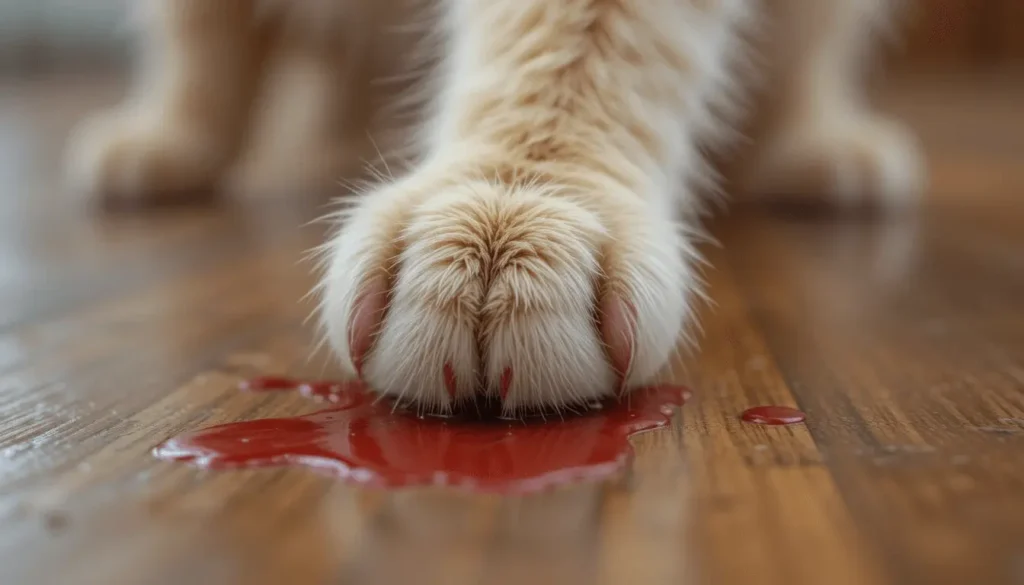
How to Safely Introduce Raspberries
Step-by-Step Introduction Guide
- Preparation:
- Wash thoroughly (remove pesticides)
- Mash or puree (no whole berries)
- Remove all leaves/stems
- First Trial:
- Offer 1/4 teaspoon
- Monitor for 24 hours
- Check litter box output
- Signs to Watch For:
- Positive: Normal energy/appetite
- Negative: Vomiting, diarrhea, lethargy
Creative Serving Suggestions
For cats that tolerate raspberries:
- Frozen berry mash (teaspoon size)
- Mixed with plain yogurt (if dairy-tolerant)
- As a lickable topper on regular food
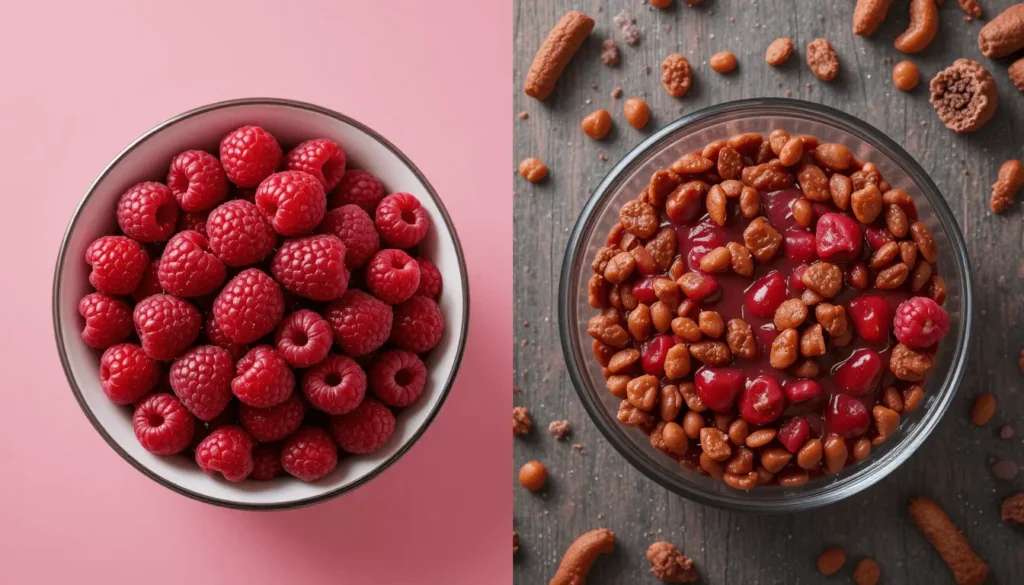
When to Avoid Raspberries Entirely
Skip raspberries if your cat has:
- Diabetes
- Chronic digestive issues
- Obesity problems
- Known food allergies
Expert Alternatives to Raspberries
For cat-safe treat alternatives, consider:
- Meat-Based Options:
- Freeze-dried chicken
- Salmon flakes
- Commercial cat treats
- Vegetable Alternatives:
- Steamed pumpkin (for fiber)
- Cooked green beans
- Cat grass
- Commercial Fruit Treats:
- Specially formulated cat “smoothies”
- Veterinary-approved fruit blends
Conclusion: To Berry or Not to Berry?
After diving deep into the science and consulting veterinary experts, the answer is clear: raspberries are not a necessary—or particularly beneficial—treat for cats. While an occasional berry won’t harm a healthy feline, there’s no compelling reason to make them a regular snack. Cats thrive on meat-based diets, and their bodies aren’t designed to extract much nutrition from fruits.
If you do decide to share a raspberry, remember:
- Tiny amounts only (1-2 berries max per week)
- Mash or puree to avoid choking hazards
- Monitor closely for digestive upset
- Skip entirely if your cat has health issues
For safer, more species-appropriate treats, stick to high-protein options like freeze-dried chicken or vet-approved cat snacks. After all, why risk an upset stomach when there are so many better alternatives?
Final thought: Your cat may eye your raspberries with curiosity, but do they really need them—or are they just fascinated by that little red rolling thing?
Wondering about other feline diet concerns? Check out our ” Safe Or Not ? Cat Food Guide ” for expert advice.
FAQs
Can cats eat raspberry leaves or stems?
No. While the fruit itself is non-toxic, raspberry leaves and stems may contain trace amounts of cyanogenic glycosides, which can release cyanide when chewed. Always remove all green parts before offering any raspberry to your cat.
What should I do if my cat eats too many raspberries?
Watch for:
- Lethargy
- Vomiting or diarrhea
- Loss of appetite
If symptoms appear, withhold food for 12 hours (but provide water) and contact your vet. The ASPCA Animal Poison Control (888-426-4435) can also advise.
Are frozen raspberries safer for cats?
Freezing doesn’t change the nutritional impact, but frozen berries can be:
- A refreshing summer treat (in tiny amounts)
- Less messy when mashed
- Helpful for teething kittens (supervised only)
Do wild cats eat berries in nature?
Interestingly, research from the Smithsonian Conservation Biology Institute shows that wild felids occasionally consume plant matter (about 2-5% of their diet), but primarily for digestive aid—not nutrition. Domestic cats retain this minimal plant tolerance.
Can diabetic cats have raspberries?
Best avoided. While raspberries are low-glycemic, even small amounts of sugar can disrupt blood glucose levels in diabetic cats. The Cornell Feline Health Center recommends sticking to vet-approved diabetic treats.

